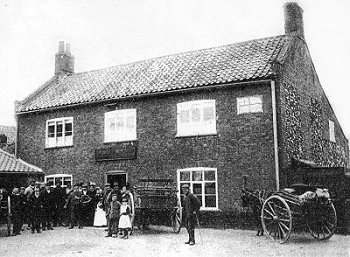 In the middle years of the Twentieth Century, the town had thirteen pubs, pretty well all of which had music on a regular basis. Wells stepdancer Jacky Jordan
In the middle years of the Twentieth Century, the town had thirteen pubs, pretty well all of which had music on a regular basis. Wells stepdancer Jacky Jordan
The North Norfolk coastal town of Wells-next-the-Sea is now a favourite holiday destination for thousands of people each year, but until about forty years ago it was a bustling local port, with coal and other goods coming in, en route to the Midlands and south, and a thriving fishing industry. Amongst all of this, there was a great amount of traditional music making in the town's many pubs.
 In the middle years of the Twentieth Century, the town had thirteen pubs, pretty well all of which had music on a regular basis. Wells stepdancer Jacky Jordan
In the middle years of the Twentieth Century, the town had thirteen pubs, pretty well all of which had music on a regular basis. Wells stepdancer Jacky Jordan![]() 1, whose dancing is very widely remembered around the area, recalled a few instances: "There was The Bowling Green, wasn't there? … used to sing and dance in there … And The Vine … we done a lot of dancing in The Vine … The back of The Globe, but that was up in the rooms, that weren't the actual pub; they had some rooms; and there was The Ship, The Shipwrights, The Fleece; we done a lot in The Fleece."
1, whose dancing is very widely remembered around the area, recalled a few instances: "There was The Bowling Green, wasn't there? … used to sing and dance in there … And The Vine … we done a lot of dancing in The Vine … The back of The Globe, but that was up in the rooms, that weren't the actual pub; they had some rooms; and there was The Ship, The Shipwrights, The Fleece; we done a lot in The Fleece."
At this time, the pubs were predominantly male environments and could be pretty rough. Jacky Jordan again: "The Prince of Wales. Yeah, we done a lot in there, yeah, but you had to be a fighter to go in there! Well, they was all boys who liked weight lifting, arm wrestling … you had to be prepared. There was one boy, nearly killed in there, weren't there? There was no weapons or anything. But some of them, they was monsters, weren't they? One of them weighed there twenty five, twenty six stone and he was about six foot six. There was several not as big as that … they all used to go in there. Well, I used to go in, but I didn't argue!"
"At that time, oh yeah, they all had music, yeah. Course, when I'm talking about, the women didn't go in pubs then. Only certain ones, y'know … not hard ones; and I remember a woman name of Robinson, "Chaudy" they used to call her; well, she used to go in; she could sing! Could really sing, yeah. If you were outside, you could hear her. Never had no mikes that time of day … but you could hear Chaudy. We used to get outside as kids and listen, y'know … but that was lovely when we were kids. We used to sit; used to hover around th'old pub then. Especially The Ship. That used to have a lot of life in it, The Ship."
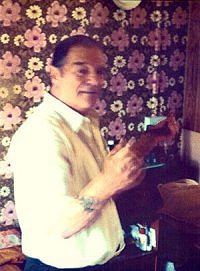 Jacky Jordan, who worked at all sorts of labouring jobs around the area, was a flamboyant dancer, who partly learned his individual style from his father, and who did not have a favoured tune to dance to, unlike many local stepdancers: "More or less any tune, but the same tempo. The same sort of rhythm. Well, you know as soon as you hear the rhythm, your toes want to go, and that's the one to dance to …" His speciality was to be able to jump up onto the bar whilst stepping: "The old Railway
Jacky Jordan, who worked at all sorts of labouring jobs around the area, was a flamboyant dancer, who partly learned his individual style from his father, and who did not have a favoured tune to dance to, unlike many local stepdancers: "More or less any tune, but the same tempo. The same sort of rhythm. Well, you know as soon as you hear the rhythm, your toes want to go, and that's the one to dance to …" His speciality was to be able to jump up onto the bar whilst stepping: "The old Railway![]() 2 … we used to get on top of the counter then. They never cared about anything, did they? That used to be a long counter then, didn't it, at The Railway, when Bill had it? ... Cause, I used to get on the bar, right on top of the bar. Some of them used to let me and some didn't …"
2 … we used to get on top of the counter then. They never cared about anything, did they? That used to be a long counter then, didn't it, at The Railway, when Bill had it? ... Cause, I used to get on the bar, right on top of the bar. Some of them used to let me and some didn't …"
"I tell you when we used to dance a lot, after we'd worked on the boats and run the plank with corn and that on my head … we used to get so much a boat, and then of course we used to go straight into the pub, after we'd finished; and that'd be a night out! She used to have to come down if she wanted any money; she had to have to come down there to get some money off me, do I'd spend it all, you see … have that old music goin', y'know, and dancin' half the night!"
Formal step dancing contests seem to have been rare in Norfolk, but there was often a spirit of contest: "If there was a few, you'd have a competition to see who could last the longest; weren't actually a competition, that was a stamina test … you'd all be dancing, see who could be there the longest." However, Jacky was involved in a contest on one occasion during the Second World War, when he was in the army and stationed at Mousehold in Norwich: "Some hall, we went in there … and you had to do ten minutes, and that's a long time. You danced on top of the stage and the people who judged it were under the stage … and I went in this thing; there were several in it and I never won it. I done reasonably well at it."
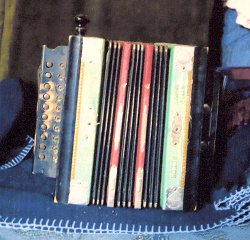 As well as step dancing, Jacky went to all the local dances with his wife Edna, and both are well remembered as very accomplished dancers. Edna comes from a musical family: her grandfather Walter Allison
As well as step dancing, Jacky went to all the local dances with his wife Edna, and both are well remembered as very accomplished dancers. Edna comes from a musical family: her grandfather Walter Allison![]() 3 was a step dancer from nearby Hindringham, dancing regularly in The Lion and The Duke there. Her grandmother played the accordion, although not in the pubs: "Yeah, but Granny wouldn't go in the pub much. She might go up and tell him to hurry, her dumplings were nearly ready, but she didn't use to go in the pub, not in my time of day … We used to sing together Sunday afternoons when she used to play her accordion, and night times … we didn't sing songs on Sundays, we had to sing hymns! She used to play it Saturday nights while the men had gone to The Duke. We used to have a sing-song …"
3 was a step dancer from nearby Hindringham, dancing regularly in The Lion and The Duke there. Her grandmother played the accordion, although not in the pubs: "Yeah, but Granny wouldn't go in the pub much. She might go up and tell him to hurry, her dumplings were nearly ready, but she didn't use to go in the pub, not in my time of day … We used to sing together Sunday afternoons when she used to play her accordion, and night times … we didn't sing songs on Sundays, we had to sing hymns! She used to play it Saturday nights while the men had gone to The Duke. We used to have a sing-song …"
The family members were regulars at the local dances: "They used to do all the old fashioned Long Dances![]() 4 and all the old fashioned dances like the polka and all them sort of things; and the one-steps and all them." Music for these dances was provided by local bands such as the Newstead family from Cockthorpe, comprising fiddle, melodeons and banjo
4 and all the old fashioned dances like the polka and all them sort of things; and the one-steps and all them." Music for these dances was provided by local bands such as the Newstead family from Cockthorpe, comprising fiddle, melodeons and banjo![]() 5.
5.
By the 1930s however, an enthusiasm for country dancing in schools was evident and pupils were being taught a wide range of dances other than those which had been current in the local communities, as recalled by Edna: "Well, I sort of got a bit off on her (her grandmother). We used to do the old-time dances; dance the old-time dances, but then, y'see, when I went to school at Thursford we had a teacher from Melton Constable (teacher training school), and as soon's you're old enough to dance … I was about eight when I went to Norwich, to the festival of country dancing … Thursford School won it and that was in St Andrew's Hall, Norwich … Muriel Baldwin, she came from Melton Constable, and when we were in the little room she used to take us what could dance out of there and we used to dance. We'd go up to Thursford Park … We used to go up there and dance …"![]() 6
6
Music and dancing played a large part in the family occasions of the Allisons and Jordans around the Wells area, as remembered by Edna: "When we had our little wedding at Hindringham, my grandfather was there and his sister Dorothy did the ladies' step dance to the old fashioned step dance my grandfather did."
To return to the town's pubs; one well remembered musician was Harry Flood, who played one-row melodeon in The Ship, as remembered by Geoffrey Tuck: "Yeah, Harry used to play in The Ship. He was a Ship man. People went to a pub and they were regulars in the same pub. And that's where I knew Harry to be a regular … But Harry's father, Old Jimmy, was a marvellous old boy as well, Jimmy Flood … he played the little old squeezebox. These little button things, y'know. They'd all sit there and they'd all join in. They'd all sing. Old Ben Painter, Ben; he couldn't play nothing. He'd stand up and start singing as soon as he got in the pub. And everybody joined in. Everybody was in, especially Saturday nights. That was the night when you had to get there early, to get a seat."
"The old Shipwrights was another good old pub, along the East End there; they had a good piano in there. Someone used to play the piano … Dick Dalliston … He was a lovely fella. Good musician. He played here quite a lot. I played with him quite a bit …" Kath Youngman of Wells also remembers Dick Dalliston's playing: 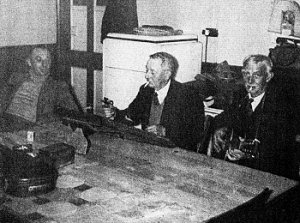 "He used to play across here (The Shipwrights) … If I knew Dick was over there playin', we used to go in that little back room when that was a pub. Oh yeah, he could make a piano talk really. He got drowned here, didn't he?"
"He used to play across here (The Shipwrights) … If I knew Dick was over there playin', we used to go in that little back room when that was a pub. Oh yeah, he could make a piano talk really. He got drowned here, didn't he?"
Another regular musician in The Shipwrights was Kath's husband John Youngman, a whelk fisherman, who played accordion, dulcimer and piano, as Kath recalls: "Well, he'd have a go, no doubt, if there was ever any chance. Oh, he used to sometimes get on the piano in The Shipwrights and what he used to say was, "But if I start, there'll always be somebody come along better … " Well, he was a character really. He was very much an extrovert anyway. He was a man's man, sort of thing. He loved being with men and he liked talking, and he loved nature; I mean, I don't think he hardly ever went up the town. Very, very occasionally went in the town. He was always on the quay … John could never play an instrument like he played the piano; he'd vamp. I mean, I'd never seen anyone do it. He used to go all along the keys with his knuckle …"
A regular visitor to the town and a good friend of the Youngmans was Hingham dulcimer player Billy Cooper. Billy would stay with the Youngmans or with John's mother and the company would head off to one of the pubs for a night of music. Kath Youngman remembers her brother saying of Billy that "when he'd got a drink or two, his sticks used really go, y'know!" Of these nights, Jacky Jordan remembers: 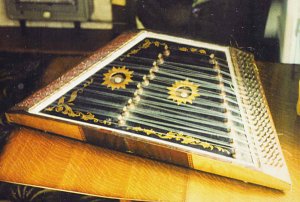 "Yeah, yeah. I danced to him (Billy)…when we went there and had Christmases, we used to stay; we never used to come home; we used to sleep in the pub. Ruby (Cooper – landlady of The Shipwrights) used to bring us a bit of grub in the morning, if we were fit enough to eat it."
"Yeah, yeah. I danced to him (Billy)…when we went there and had Christmases, we used to stay; we never used to come home; we used to sleep in the pub. Ruby (Cooper – landlady of The Shipwrights) used to bring us a bit of grub in the morning, if we were fit enough to eat it."
John Youngman had a very ornate dulcimer, an instrument which was acquired and restored for him by Billy Cooper, after he had sold his old one to an American serviceman, as Kath Youngman recalls: "The original went to America, his original dulcimer. He sold to an American. And Billy knew about this one at Kelling. I don't know who he bought that dulcimer off … it was in a terrible state. Billy said, "I'll get it for you" … Billy done a lot to it. He painted it all up and everything. He put all those stars what are on it, y'know. He done them all with gold paint. I forget where he got the wire from. Somewhere in Norwich, I expect. He took it home and he re-wired it all up and he brought it here - cause they have a little key to tune it up - and he tightened 'em all up …" The dulcimer is a beautiful example of a typical Norfolk style instrument.
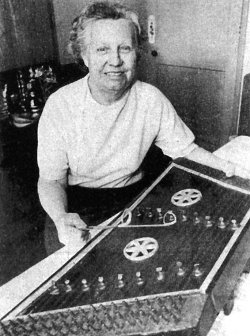 Another dulcimer player in the town was Molly Whittaker, although she seems to have played out in public very rarely, perhaps because her husband didn't drink and pubs were the main places for performance. Kath Youngman remembers: "But I never did actually see her play only once, and she played in The Bowling Green … I suppose that was about thirty years ago … She was a Rutland before she married. I think they were all a bit musical. Dick Whittaker, who she married; he never did drink and she was in The Bowling Green that particular night and she said, "I shall get ever so told off when I go home." I don't think he was very keen on her going in the pubs playing. I mean, she never did drink a lot! She just loved the music." Molly's father, James Rutland, had also been a dulcimer player, accompanying the Wells quoits team on their trips to nearby villages, where dancing would follow the matches.
Another dulcimer player in the town was Molly Whittaker, although she seems to have played out in public very rarely, perhaps because her husband didn't drink and pubs were the main places for performance. Kath Youngman remembers: "But I never did actually see her play only once, and she played in The Bowling Green … I suppose that was about thirty years ago … She was a Rutland before she married. I think they were all a bit musical. Dick Whittaker, who she married; he never did drink and she was in The Bowling Green that particular night and she said, "I shall get ever so told off when I go home." I don't think he was very keen on her going in the pubs playing. I mean, she never did drink a lot! She just loved the music." Molly's father, James Rutland, had also been a dulcimer player, accompanying the Wells quoits team on their trips to nearby villages, where dancing would follow the matches.![]() 7
7
Christmas time was unsurprisingly a time for much music and merriment, as Geoffrey Tuck recalls: "I'll tell you what, one night we come out of the pub; pubs used to close at ten all them years ago, strict on ten, there weren't extensions for Christmas Eve or New Year's Eve, even; and we would sing our hearts out until ten o'clock … and we came out of there and we started to sing carols. And in no time we had a hundred people around us, singing. We walked up the Glebe, these people all following us, all singing, around the corner, up Clubbs Lane, round the top of the street, along the top, down Standard Road and onto the quay, and that's where Bob Youngman lived, John's father … two or three policemen, even had them joining, walking along with us, singing, Oh Come All Ye Faithful and all that."
"Howsoever, got to John Youngman's … went through the gate, and we just disappeared in there and they just went their way. Knocked on the door, sung O Come All Ye Faithful. Bob opened the door; said, "Come on in, my boys. I've been waiting for you!" Do you know what, they had a great big dining room … and that was all set out with a Christmas spread. Right across the room. Hams, meats, everything you could think of. That was a wonderful sight! And we stopped and sang, and we kept singing and we kept singing and we kept singing. Some of us fell asleep, some of us woke up. Bob kept going … "Go on, boy, give us another one!" That got daylight, we were still there …"
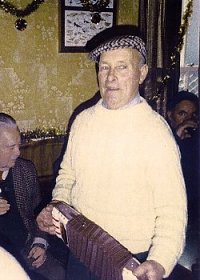 Wells Carnival and Wells Regatta were also annual occasions for much music. Geoffrey Tuck again: "Regatta nights were just fantastic, Regatta nights in the pubs, with the Fair all on the quay. Hundreds of people; we had trains then, y'see, trains running people into Wells for Wells Regatta and the Carnival. The pubs would be full, all day. The pubs would be open from dinnertime, right through to ten o'clock at night. There'd be music going all the while. They used to go round with a collection in them days. They used to collect for the musicians; when you'd collected, that was only pennies and ha'pennies perhaps, but maybe now and again there'd be a half crown chucked in. You could have a night out for a half crown. Marvellous!"
Wells Carnival and Wells Regatta were also annual occasions for much music. Geoffrey Tuck again: "Regatta nights were just fantastic, Regatta nights in the pubs, with the Fair all on the quay. Hundreds of people; we had trains then, y'see, trains running people into Wells for Wells Regatta and the Carnival. The pubs would be full, all day. The pubs would be open from dinnertime, right through to ten o'clock at night. There'd be music going all the while. They used to go round with a collection in them days. They used to collect for the musicians; when you'd collected, that was only pennies and ha'pennies perhaps, but maybe now and again there'd be a half crown chucked in. You could have a night out for a half crown. Marvellous!"
One singer who took part on these occasions was Stanley Thompson, who delighted in making up parodies of traditional and popular songs and was a regular in singing sessions in several pubs, particularly The Ship. He was also involved in the Holkham Players concert party, as was Molly Whittaker. His son Adrian recalls one amusing anecdote: "He was at Holkham Concert doing a rehearsal; he'd only just been taken aboard the concert party; and they had this very, very starchy piano player, who I think probably played piano in the silent movies, the way she played; but she was a bit starchy and Dad got up on stage to do his sort of little bit of a turn and she said, "Right, Stanley, what key's it in?" And he sort of looked bewildered and said, "Well, the only bloody key I know is Wells Quay!" … My father had no comprehension what a key was."
In common with Norfolk in general, and indeed the country at large, much of this traditional music making was disappearing in Wells at the same time as the pubs themselves were being closed down by the breweries. The Vine, The Ship, and The Prince of Wales all closed in the 1960s, followed by The Park Tavern and The Eight Ringers in the 1970s. By the end of the 1970s only six pubs remained in the town; in none of these were there regular nights of singing and step dancing, although such evenings are fondly remembered by a great many in the town.
Chris Holderness - 8.12.06
Rig-a-Jig-Jig: A Norfolk Music History Project
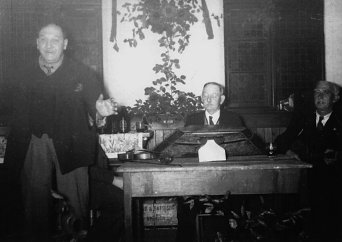 1. The interviews with Jacky and Edna Jordan were carried out by Des Miller and Melody Lovelace in June and July 2000 and by myself and Des Miller in June 2005.
1. The interviews with Jacky and Edna Jordan were carried out by Des Miller and Melody Lovelace in June and July 2000 and by myself and Des Miller in June 2005.
2. The Railway Hotel; the landlord was Bill Steward. The pub closed in 1999.
3. For detailed information about the Allisons and other music making in Hindringham, see: Social Dancing in a Norfolk Village, 1900-1945, Ann-Marie Hulme and Peter Clifton in Folk Music Journal, Vol3 No4, 1978. See also Tips and Clates, Jennifer Millest in English Dance and Song, Vol.36, No.1, 1974 and Solo Step Dancing Within Living Memory in North Norfolk, Ann- Marie Hulme and Peter Clifton, 1981.
4. The Long Dance was a very popular country dance throughout the county, with numerous variants. See Social Dancing in a Norfolk Village, as above and Musical Traditions article MT179.
5. For more information on Walter Newstead and his family, see Musical Traditions article MT182.
6. For a detailed discussion of the local social dances in Hindringham and the country dance revival, see Social Dancing in a Norfolk Village as above.
7. Five recordings of Molly Whittaker's dulcimer playing can be heard on Veteran cassettes I Thought I was the Only One; VTVS07/08.
Article MT196
Top
Home Page
MT Records
Articles
Reviews
News
Editorial
Map